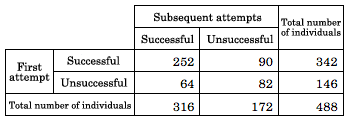Toward the realization of economic revival through the creation of new businesses
The third pillar of the Abenomics economic policy approved by the Cabinet in June 2013, which was announced in the "Japan Revitalization Strategy: Japan is back" (Headquarters for Japan's Economic Revitalization, 2013), sets new business creation as a key goal, and aims to leverage the nation's still-dormant technologies, funds, and human resources to the maximum degree in order to support the creation of venture businesses and other new business opportunities.
One key element to this goal is the serial entrepreneurs. Serial entrepreneurs are defined as individuals who start more than one business in their lifetime. In Europe and the United States, academic research has been conducted on such individuals in response to the practical interests of how venture capitalists (VCs) select entrepreneurs.
Previous studies on serial entrepreneurs
Hsu (2007) surveyed entrepreneurs who were funded by VCs in the United States and showed that serial entrepreneurs tend to enjoy higher business valuations from VCs compared to their non-serial counterparts. Such tendency was even more prominent among those who achieved high returns on their investments in the past. Westhead et al. (2005) found that serial entrepreneurs surveyed in Scotland generated more sales than their non-serial counterparts. The study also divided serial entrepreneurs, as defined above, into two groups: 1) those who had handed responsibility at their older start-ups over to someone else and were currently focusing on a single start-up, and 2) those who continued to oversee multiple start-ups. Further analysis of these groups showed that the latter tended to achieve even higher sales.
Key findings from RIETI's Survey on Entrepreneurship
It is possible that expectations and evaluation from business partners and investors on serial entrepreneurs differ among countries. With that in mind, let us look into whether there is a high probability that serial entrepreneurs in Japan including those who do not receive VC funding will succeed.
According to the Survey on Entrepreneurship conducted by RIETI last year [see Baba & Motohashi (2013) and Matsuda & Matsuo (2013) for the details], among the 1,307 entrepreneurs surveyed who had started businesses by the end of 2009, (Note 1) 488 were serial entrepreneurs. Table 1 shows the distribution of successful start-ups (defined as having turned a profit in at least one fiscal year) in the entrepreneur's first and subsequent start-up attempts (Note 2).

We conducted a statistical test on successful first-time entrepreneurs and those who had failed in their first attempt to see if there is any significant difference in their likelihood of success in subsequent attempts, and the result rejected our null hypothesis that there is no such difference. We further tested the statistical independence between the distribution of the first and subsequent successes, which again led us to reject the null hypothesis.
We can conclude that entrepreneurs with a track record of success are much more likely to succeed than those who have previously failed, or that their initial success is not unrelated to their subsequent performance.
Skills of serial entrepreneurs
Why is it, then, that those with a track record of success are more likely to repeat the feat in subsequent attempts? Gompers et al. (2010) show that serial entrepreneurs who repeat success (here, defined as listing a company) are skilled at selecting the right industries and timing to start new ventures. Such skills are different from the management skills learned through starting businesses. VCs and business partners see an entrepreneur's success the first time around and take it as proof that he/she has these particular skills, which leads them to providing more funds and other resources to the entrepreneur's subsequent ventures, making their further success more likely.
In fact, Martin & Osberg (2007), which outline case studies of serial entrepreneurs, point out that such entrepreneurs' record of past success is used as their most effective tool in convincing investors in negotiating investment conditions.
Now, the question is whether these skills of the serial entrepreneurs are transferable to others. If that is the case, it is possible to increase the number of successful entrepreneurs and nascent entrepreneurs by academically revealing their skills and disseminating them widely. This is the reason why I stated at the outset of this column that serial entrepreneurs are a key element for the success of the Japan Revitalization Strategy.
I am determined to continue furthering my research on serial entrepreneurs from that viewpoint.


